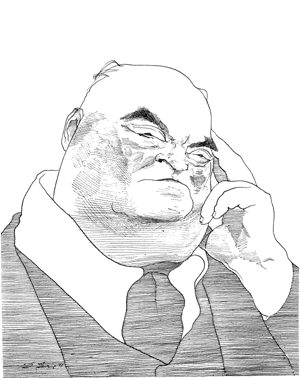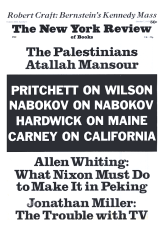This book is the account of Edmund Wilson’s love affair with an old family house. The story opens with a good deal of family history and then proceeds with selections from his diary between 1950 and the present day. Such acts of piety toward the past are a natural eccentricity now that society has become mobile and anarchic, where people are uprooted, when cities, towns, and villages disintegrate and become wastelands. The more demoralized the public state of the world and society become, the more in middle age one dreams of disappearing into the small settled hide-out. “Il faut cultiver notre jardin“—if one can find a garden that is not run-down.
In the United States—it seems to my foreign eye—the thrill of not having roots runs together with the nostalgia for them, simply because it is easier than it has ever been in Europe, so far, to lose them entirely. I would guess, also, that dwelling on family roots, and the idea of cousinage, though rather platonic, is far stronger in the United States than outside it, perhaps because of colonial or immigrant memories. Except among pockets of the landed gentry in my own country, this interest in family is almost extinct. With us it becomes generalized in the boiled pudding called “tradition” and the strong snail-like feeling that “home” is inside the shell we carry about with us. It is a state of mind or heart rather than a place or people. I do not think we see home as some princesse lointaine to be recovered from the past or to be sought in the future. I know very few English people who feel a need to “go back”; and, in this respect, Americans often seem to us “older” than we are.
The whole subject is raised by Edmund Wilson’s strange affair with the Stone House at Talcottville in upstate New York—strange to me, as an outsider, in the sense of its being an adventure. Of course, Mr. Wilson’s founding quality as a traveler and critic has always been his organic sense of history. He is a man for the records. The vicissitudes of public and private life in upstate New York feed his passion for the house. History is a language for him. He is as pertinacious about Talcottville as he was with the Dead Sea Scrolls. If there are bees in a historical bonnet he loves to hear them buzz.
The Stone House in that now dying region was once a very fine place of local limestone at the end of the eighteenth century, and came to his mother in the end after some feeling between the Talcott and the Baker families. He himself spent holidays there in his boyhood. The place came into his hands in the Fifties after his mother’s death and was then a musty, ghost-ridden wreck and going to pieces at a street corner in the little town, from which most of the active population had moved on.
On Cape Cod he always felt, he says, “keyed up” and overexcited. But upstate, perhaps owing to the altitude (he says), he feels calm and sleepy. Anyway, the love affair and the attempt to make the old bones of the place live began. It was often a torment, but still,
I enjoy “galvanizing” this old house into life, as I feel I have at last been doing, making it express at last my own personality and interests, filling it with my own imagination, yet feeling a continuity with everybody who has lived here, basing myself in some sense on them—the older I grow, the more I appreciate them. Intellectually and geographically I travel further from them, yet also now more fall back on them, probably become more like them; feel more comfortable and myself here probably than anywhere else in the world.
In this country skies are high and wide and the wilderness, as so often in America, has crept back as the hungry or adventurous have left. There is a return to the wild. The place names suggest not permanency, but the disappointed hopes of orphaned travelers: Carthage, Rome, Utica, Ithaca, Tyre, Poland, Denmark, Copenhagen, Russia, and—of all things—Sodom. One seems to see the torn pages of the Bible, Sermons and Learning, left like litter in forest once cleared but heart-breaking in the end. Mr. Wilson explored Sodom. Odd that sects and preaching had been the passion in this primitive part of the Adirondacks:
…I began to think that the people could never have read the Bible at all. A few scattered camps; a few human beings—we wondered what they did for a living. We had lunch at a rather crude restaurant. After this, the road was no longer surfaced. Someone from whom we asked for directions said of Sodom that it was “down the road: you just wink your eye”—by which he meant that it was insignificant, and actually we passed through it….
Now it has a ski motel. A man who had bought the property there wanted to have the postal address changed to Peaceful Valley.
Advertisement
These bad jokes of history are only a small part of the scene. Nature has run wild, the surviving farmers struggle hard. As the human population declines the wild animals creep in. The wild cats swarm and kill the deer. The place is a paradise for zoologists. One of these, who looked like a small mammal himself, found a curious race of water shrews. They have a fringe on their hind feet and are the only animals known that, like water bugs, can skate on the surface of the water. When they dive they secrete bubbles of air in their fur so that they can rise easily to the surface.
There were corn-yellow-beaked cuckoos, huge blue cranes. As for the summer flowers, there were the closed gentians and cardinals, a pink water flower on its web of stems in the marsh—“which I later identified as ‘amphibious knotweed’ “—the insecttrapping pitcher plant, with the redveined green pitchers of its leaves which look like arteries. These last looked actually carnivorous in an animal way. We picture Mr. Wilson notebook in hand, for in all his expeditions, at home and abroad, he is a real writer of the old documenting school, spry and exact with the memorial. So in these selections from a diary over twenty years he puts down a complete grammar of himself, places, and people. And while he is doing this, one remembers that at home he will be writing his books on the Scrolls, the Iroquois, the French Canadians, and having his troubles with the tax collector.
He is a genuine man of letters, never “writing up” as a journalist, but writing down his facts phlegmatically. A fact, once discerned, has the sacredness of a noun. His curiosity is Balzacian. This deliberateness may strike one as odd in a “man of the Twenties” (as he calls himself) who in those iconoclastic years went all out for excitement, but it was always there, giving a depth and solidity to his work, however acid or petulant the comment. His eye has always been hard and clear.
The love affair has had its troubles. Talcottville depressed Mrs. Wilson. She saw ghosts in the house. She preferred the Cape. Mr. Wilson, often alone and writing in his room with kittens jumping on his table, became deep in Hungarian grammar, a matter helped by Hungarian immigrants in the neighborhood. The dilemma of the immigrant torn between America and his own mother country could be studied as a spiritual matter in Talcottville. So could the local delinquent youths. The Stone House had a bad situation on the main street. When the Wilsons were away hooligans broke in, stole, smashed windows. They even smashed the panes on which famous visiting writers had inscribed poems with a diamond pointed pen. Bricks went through the inscriptions made by Auden, Spender, and Nabokov. When the Wilsons were in the house the youths bawled outside in the evenings, rode their motor bikes up and down, introducing what Mr. Wilson bitterly calls the contemporary “flux.” There was no entertainment for the lads: the old rural trouble in a new raucous form.
Then there is a threat of a new highway that will run a few feet from the front door. The “flux” is winning. Still obstinately Mr. Wilson clings to his dream though age and ill health make it all hard to bear. Literature is one mainstay. He rereads Turgenev. But Thurber and then Hemingway die: deeply upsetting.
The desperation in his stories had always been real: his most convincing characters are always just a few jumps ahead of collapse…. The press and the public, instead, took their cue from his public show of full-blooded and triumphant vitality. Having created this delusion himself, he fell in with it enthusiastically.
He talks about Morley Callaghan. There is an amusing visit from Nabokov where they quarrel happily about translations—great triumph when the Russian and his wife are caught thinking that the French fastidieux means fastidious. He enjoys Nabokov’s “mauling” romps in talk, points out that he was disgracefully overworked in the universities—a favorite bugbear; but a year or two later Mr. Wilson begins to regret a little that he has attacked the academics so outspokenly. A minor part of the difficulty between academics and writers outside the academy is that they have different shop talk. It is rather touching to see Mr. Wilson saying how “rousing and necessary” for him the shop talk of his own kind is. To Mike Nichols, who had criticized Thurber for boasting about the people who came to see him backstage after his show, Mr. Wilson says,
Advertisement
I answered that, depressing though it might seem to him, getting older, for a writer, did not necessarily give you self-confidence. I told him that I sometimes got up at four o’clock in the morning to read old reviews of my books.
After all, writers are egotists with only words to cling to.
Diaries are only for dipping into, but the attraction of Mr. Wilson’s lies in its unconscious self-portraiture. He is energized by the interests that have made him a great American critic and masterful eccentric. He has always been a searching observer. As he says, he has always been interested in countries, flora, fauna, primitive men and mechanized men, as well as in books, and now, after a long life, and, alas, ailing, he expects no real novelty. His curiosity now is for what mildly amuses his formidable faculties. And he stands by the strange affair which age has made alarming:
In spite of the encroachments of the highways and the element of impoverished ambitionless inhabitants, I have still, I think, just enough money to keep the old place going….
Somewhere he talks of himself as trying to become a sedate old gentleman. Sedate is a word one will never apply to him. Tough, stoical, half-shrewd, half-unworldly in the bliss of the belief that the printed word is the only reality, he sticks to being incurable in a world he finds less and less easy to bear. His eagerness makes this a very touching book.
This Issue
October 7, 1971




